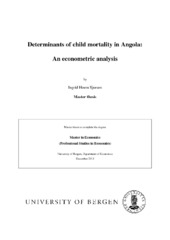Determinants of child mortality in Angola: An econometric analysis
Master thesis
Permanent lenke
https://hdl.handle.net/1956/5704Utgivelsesdato
2011-11-30Metadata
Vis full innførselSamlinger
- Department of Economics [289]
Sammendrag
The aim of this thesis is to investigate determinants of child mortality in the regions of Luanda and Uíge in Angola. The country has one of the highest child mortality rates in the world. The literature on the subject has found extensive variation in causes of death between and within countries, and knowledge on local conditions is a prerequisite for shaping sound and efficient policies addressing the problem. The analysis is conducted using data collected jointly by the Christian Michelsen Institute (CMI) and Centro de Estudos e Investigação Científica (CEIC) in 2010. In the descriptive analysis, I find large differences in infant and under-five mortality between wealth quintiles, education levels and households belonging to different public health facilities. In the econometric analysis, OLS, Poisson and binary logit models are estimated using both number of infant and under-five children dead as the dependent variable. The analysis puts particular emphasis on the effect of wealth, education, use and access to health services. While I find no effect of wealth, education, use and access to delivery services are found to be significant determinants of child mortality. All calculations and estimations are conducted using STATA version 11.1.
